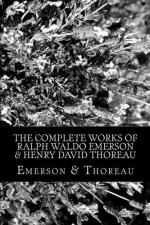|
This section contains 15,798 words (approx. 53 pages at 300 words per page) |

|
SOURCE: “The Nature of War in Emerson's ‘Boston Hymn,’” in Arizona Quarterly, Vol. 49, No. 3, Autumn, 1993, pp. 21-58.
In the following essay, Cadava traces the link between nature and politics, in addition to examining Emerson's views on war in the context of his poem “The Boston Hymn.”
Less than five years before the outbreak of the Civil War, Emerson announces a crisis in the structures of political and linguistic representation. “Language has lost its meaning in the universal cant,” he writes, “Representative Government is misrepresentative; Union is a conspiracy against the Northern States which the Northern States are to have the privilege of paying for; the adding of Cuba and Central America to the slave marts is enlarging the area of Freedom. Manifest Destiny, Democracy, Freedom, fine names for a ugly thing.”1 He makes this statement within the context of the controversy over the Kansas-Nebraska Act. This Act had...
|
This section contains 15,798 words (approx. 53 pages at 300 words per page) |

|


